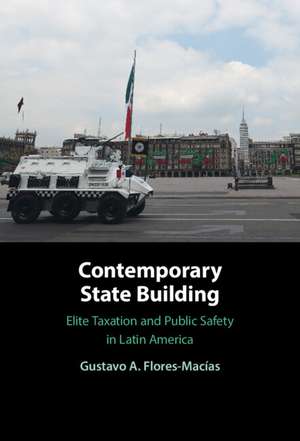Contemporary State Building
Autor Gustavo A. Flores-Macíasen Limba Engleză Hardback – 8 iun 2022
Preț: 581.48 lei
Preț vechi: 653.35 lei
-11% Nou
Puncte Express: 872
Preț estimativ în valută:
111.30€ • 120.94$ • 93.55£
111.30€ • 120.94$ • 93.55£
Carte tipărită la comandă
Livrare economică 21 aprilie-05 mai
Preluare comenzi: 021 569.72.76
Specificații
ISBN-13: 9781316515129
ISBN-10: 1316515125
Pagini: 260
Dimensiuni: 157 x 235 x 19 mm
Greutate: 0.49 kg
Ediția:Nouă
Editura: Cambridge University Press
Colecția Cambridge University Press
Locul publicării:New York, United States
ISBN-10: 1316515125
Pagini: 260
Dimensiuni: 157 x 235 x 19 mm
Greutate: 0.49 kg
Ediția:Nouă
Editura: Cambridge University Press
Colecția Cambridge University Press
Locul publicării:New York, United States
Cuprins
I. Introduction: Contemporary state building in Latin America; II. Latin America's elite security taxes; III. A theory of elite taxation and the determinants of security taxes; IV. Colombia's targeted security taxes; V. Costa Rica's “soft” security taxes; VI. El salvador's failed and diffuse taxes; VII. Mexico's uneven security taxes; VIII. Conclusion.
Recenzii
'In Contemporary State Building Gustavo Flores-Macías takes on two issues generally treated separately: responses to insecurity and the politics of taxation. In a masterful work Flores-Macías uses precisely this juxtaposition to show how even weak states can sometimes effectively tax elites to provide public goods.' Marcus Kurtz, The Ohio State University, author of Free Market Democracy and the Chilean and Mexican Countryside and Latin American State Building in Comparative Perspective: Social Foundations of Institutional Order
'Flores-Macías has once again made an important contribution to our understanding of elites and the state in Latin America. Policymakers, political theorists, students, elites, and activists would be wise to consider the lessons of this work in devising their strategies for building viable states, addressing crises of development, and pursuing justice.' Aaron Schneider, University of Denver, author of State-Building and Tax Regimes in Central America
'Right-wing governments are usually disinclined to tax the wealthy, and cozy relations between government and business typically produce states that are more captured than capable. Yet under conditions of extreme security threat, Gustavo Flores-Macías convincingly argues, Latin America has sometimes experienced bouts of state-building through heightened elite taxation under conservative, pro-business rule. A nicely nuanced contribution to our understanding of the complicated political pathways through which internal violence shapes the origins of state power.' Dan Slater, University of Michigan, author of Ordering Power
'Flores-Macías has once again made an important contribution to our understanding of elites and the state in Latin America. Policymakers, political theorists, students, elites, and activists would be wise to consider the lessons of this work in devising their strategies for building viable states, addressing crises of development, and pursuing justice.' Aaron Schneider, University of Denver, author of State-Building and Tax Regimes in Central America
'Right-wing governments are usually disinclined to tax the wealthy, and cozy relations between government and business typically produce states that are more captured than capable. Yet under conditions of extreme security threat, Gustavo Flores-Macías convincingly argues, Latin America has sometimes experienced bouts of state-building through heightened elite taxation under conservative, pro-business rule. A nicely nuanced contribution to our understanding of the complicated political pathways through which internal violence shapes the origins of state power.' Dan Slater, University of Michigan, author of Ordering Power
Notă biografică
Descriere
Explains successful contemporary state-building arrangements that lead to difficult-to-achieve elite taxation to improve public safety in Latin America.
